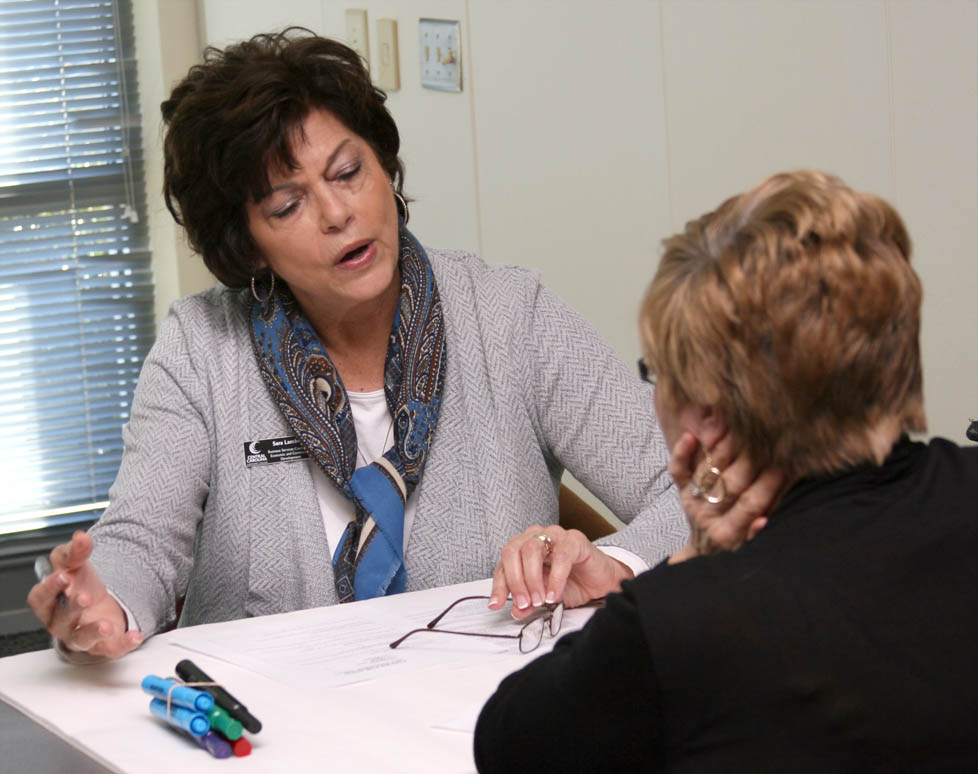College News
Compassion '15 helps nonprofits avoid pitfalls and make a high impact
Notice: This article is older than 12 months. Names, contact information, programs, titles, etc. might have changed. If you have any problems please call the main college number, 1-800-682-8353, and we will be happy to direct you accordingly.
From UNITED WAY OF LEE COUNTY
SANFORD, N.C. - Nonprofits often chase success by pursuing goals that don't actually make a big difference, but a few essential practices can help any organization make a real impact.
Consultant Deborah Warren made that case to more than 50 nonprofit leaders Feb. 3 at Compassion '15, the sixth-annual community roundtable offered by United Way of Lee County in partnership with Central Carolina Community College and the Sanford Area Chamber of Commerce.
Drawing from "Forces for Good," a popular book synthesizing research from a dozen high-impact nonprofits across the United States, Warren said many organizations focus on things like building a budget and brand. While that kind of "common wisdom" can be helpful, it doesn't guarantee success.
Instead, they should begin not only by providing services, but also working with governments to shape social policy. "It's a common misconception that nonprofits can't do lobbying," said Warren. "There are some things they can't do, but those are just a few. Somehow, you just need to find a way to work with governments, advocate for policy and provide services. Fear of lobbying holds some organizations back."
But it's not just important to work with governments. Warren said nonprofits also must build relationships with businesses and learn to harness market forces, something many nonprofits may be hesitant to do.
Most important of all could be finding some way to convert their existing supporters into people who are zealous for the cause and inspire others to help -- people book authors Leslie Crutchfield and Heather McLeod Grant call "evangelists" for the cause.
Other suggestions: Build nonprofit networks and treat other groups as allies, not competitors; be willing to innovate and adapt; and share leadership among staff, boards and others outside the organization.
After Warren's hourlong presentation, participants jumped into groups to put the suggestions into action, evaluating their own nonprofits and finding ways to change.
Jan Hayes, executive director for United Way of Lee County, said that's the core of the annual roundtable: helping ministries, governmental agencies and nonprofits become more effective.
"When we created Compassion years ago, it wasn't just another presentation," she said. "We were looking for real solutions and that's been a key to our success. Even in that first year, food pantries started sharing freezer space, which was a big help right away. But some much bigger initiatives have come directly out of the roundtable."
Hayes cited VolunteerLee.com, a website matching volunteers with needs in the community, and Charity Tracker, a service tested last fall and now being introduced. Charity Tracker allows ministries and nonprofits to share information about how their clients have been served. As a result, organizations can avoid duplicating services and help more people. Thanks to Charity Tracker, Hayes said, 73 more children received presents at Christmas.
Other highlights of this year's roundtable included a panel discussing how to cultivate "evangelists." Providing insight from their own organizations were Teresa Kelly, executive director of Christians United Outreach Center of Lee County; Doug Doris, retired CEO of Central Carolina Hospital; Larry Aiken, a community volunteer; Roger Bailey, executive director of The Stevens Center; and Kendra Martin, Volunteer Lee coordinator for United Way of Lee County.
Compassion '15 was live-tweeted by United Way of Lee County. Highlights and insight from presenters are available twitter.com/UWLeeCo.
Categories
- Admin, Faculty & Staff Category
- Arts & Entertainment Category
- Clubs Category
- College & Community Category
- College General Category
- Continuing Education Category
- Curriculum Programs Category
- Distance Education Programs Category
- Facilities/Buildings Category
- Finances Category
- Foundation Category
- Graduations Category
- Lee Early College Category
- NCCCS Category
- SGA Category
- Special Events Category
- Sports Category
- Students/Graduates Category
- Uncategorized Category
Archives


